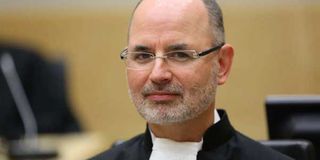How Kenya cases forced ICC back to the drawing board

Anton Steynberg, the lead prosecutor in the William Ruto and Joshua arap Sang' cases at the International Criminal Court. PHOTO | FILE
What you need to know:
- Mr Steynberg said the Kenyan cases forced the Office of the Prosecutor to evaluate its policies to avoid repeating the mistakes.
- The court has revised its outreach policy to enable the prosecutors and members of the registry to work together.
The collapse of the Kenyan post-election violence cases highlighted various loopholes within the investigatory and prosecutorial policies of the International Criminal Court, which the court is now re-evaluating.
More than a year after the last two cases involving Deputy President William Ruto and former radio broadcaster Joshua Sang collapsed, Mr Anton Steynberg, who led the trials, says the Office of the Prosecutor has learnt vital lessons and has changed its policies when approaching a situation.
Speaking in Arusha last week during an international symposium organised by Berlin-based Wayamo Foundation under the title ‘Fighting impunity in East Africa – Ensuring accountability for international and transnational organised crimes’, Mr Steynberg said the Kenyan cases forced the Office of the Prosecutor to evaluate its policies to avoid repeating the mistakes.
CHANGE IN POLICY
“One of the lessons that was learnt, and has led to a change in the policy of OTP is the fact that prior to the summonses, there wasn’t a great deal of investigation done and this was in line with the strategic policy to focus on light investigations up until the summonses stage and then fill in the gaps after,” said Mr Steynberg.
The reasons for the light investigations, he said, were because of human resource handicaps, limited financial resources at the time, as well as “18 judges sitting and waiting for cases to come in.”
“So there was need to get cases and get them quickly to court. It is for that reason that that strategy was adopted. That has been re-thought now and we have moved to investigating cases as fully as possible so that we can be as near trial-ready as possible once the accused is arrested because experience has shown that once an accused is before court things move very quickly and there is not very much time to supplement investigations until confirmation hearing is held. That is one of the lessons OTP has taken note of,” Mr Steynberg said.
REVISED POLICY
The court has also revised its outreach policy to enable the prosecutors and members of the registry to work together, something the speakers at the event acknowledged was missing in the Kenyan situation.
The shortcomings and the lessons from the Kenyan cases aside, Mr Steynberg believes that ICC’s intervention in Kenya helped prevent violence in 2013 elections.
“I like to think that ICC having its eyes firmly on Kenya was a deterrent factor among many other factors including the fact the PEV was so severe that it shocked the whole country into a recalibration and self-introspection,” he said.
The ICC originally indicted six individuals, then Deputy Prime Minister Uhuru Kenyatta who is now the president, Mr Ruto, former minister Henry Kosgey, former head of public service Francis Muthaura, Mr Sang, and former Commissioner of Police Hussein Ali.




